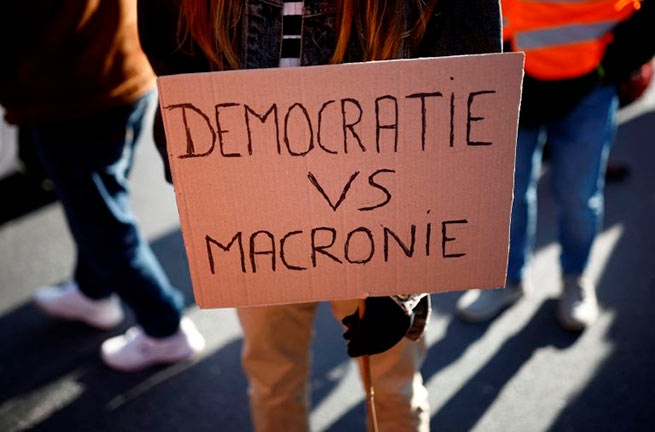As France is rocked by riots showing that it is a country deeply divided by social and economic inequalities, President Macron is implementing his plan to turn Paris into a new city.
The murder of 17-year-old Nael, a French citizen of Algerian origin, by a 38-year-old policeman in Nader sparked violent riots, highlighting the fact that that France is a deeply divided country. 18 years after the 2005 uprising, not only have social and economic inequalities not been eliminated by “aspirin” measures in the framework of “minimalist reintegration”, but they have become stronger, comments Serge Gilles in an article in Liberation.
President Emmanuel Macron accused of backtracking on a promise to reduce racial and economic disparities. Just a few miles from the poor Parisian suburb where the shooting took place, the French financial sector is booming as Macron has decided to stay true to another promise – to turn Paris into a financial hub that the City has nothing to envy.
Make Paris the new City
Many argue that the UK’s exit from EU harmed the financial competitiveness of the country. Reuters reported that since leaving the EU, London has lost billions of euros on daily trading in stocks and derivatives on the EU exchanges. Researchers at the London School of Economics noted that financial services will be one of the sectors most affected by Brexit. London, which has seen its competitiveness threatened by Citi, is trying to formulate an institutional framework, described as Big Bang 2.0, that will support this vital sector for the British economy – it generates £76 billion in tax revenue – in the face of fierce international competition .
The French president, himself a banker, has made clear his plans to make the most of Britain’s abandoned position as an economic springboard to Europe, the Financial Times report says. “When Macron came to power six years ago, he had a clear strategy,” explains the Treasury official. “The goal was to be the main beneficiary of Brexit.” France’s biggest gains in the financial services sector have come from five major US investment banks, which have relocated at least 1,600 employees to Paris, according to the Financial Times. In 2021, according to EY’s annual survey, France has overtaken the UK in the number of US financial services FDI projects heading to Europe, accounting for 19 projects compared to the UK’s 17. If traders moved to the eurozone, Paris would always be an attractive destination, but the policy planning of the Macron government is boosting this attraction.
Three Pillars of Strategy
Government officials explain that the strategy is based on three pillars.
The first is focused on tax reform. While the UK has just raised its ultra-low corporate tax rate from 19% to 25%, France has cut its own rate from 33% to 25% as well. Tax deductions of up to 50% have been established on the personal income of foreign executives and long-term expatriates returning to their home countries. The result has been a global influx of executives: for example, Bank of America in Paris now has about 600 employees (up from 70 a few years ago) from 49 different countries.
Macron’s second pillar concerns competitiveness. Along with controversial but crucial pension reform to raise the retirement age from 62 to 64, a number of labor market reforms aim to make hiring, firing and employment more flexible.
The third attractive side is political stability. Macron is not the most popular right now. But his presidency will last until 2027, and his finance minister, Bruno Le Mer, has been in office for six years. On the other hand, the UK has experienced a series of political changes with devastating consequences for its economy. Less than a year later, the Bank of England intervened to support sterling and British bonds.
But in addition to incentives, there is also a whip. The European Central Bank has consistently required the permanent relocation to the eurozone of staff involved in operations in the eurozone. French officials say the ECB’s recent fine on Goldman Sachs for misrepresenting risk capital data is likely to be used as leverage to pressure banks to move more senior risk officers to the region. At the same time, France is working to attract asset management firms. A group of hedge funds including Citadel, Millennium and Point72 have already announced office expansions.
Another factor that could play in Macron’s favor would be Labor’s victory in the UK, as they are expected to adopt tax policies that will hit the private equity industry: many CEOs based in London are from France and the eurozone, and Macron is sure to will try to get them back. However, market leaders acknowledge that the level of assets under management transferred to Paris fell short of expectations and domestic investment also declined.
After France’s record performance in 2021, the UK is back in first place for US foreign direct investment in the financial services sector in 2022 and is a much larger financial center overall. Six months ago, Britain announced a package of 30 measures, dubbed the Edinburgh Reforms, that would overhaul EU laws that “hold back growth.”
Finally, Binance, the controversial cryptocurrency exchange, chose Paris as its European hub last year, but has since been sued by the US Securities and Exchange Commission.
However, perhaps the biggest risk is social. The expansion of the financial sector, reflected in the growing influence of Anglo-American wage standards, widens the gap between the haves and have-nots. This has long been a source of friction in the UK. How much worse will Macron’s increasingly polarized France get, asks the Financial Times.







More Stories
Paris: wild clashes between police and "black" block
Modern Germans are far from the most hardworking in Europe
Georgia: Opposition leaders were brutally beaten by security forces (video)